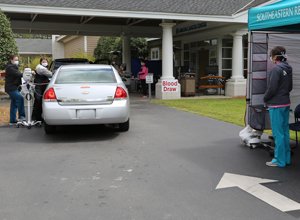Cancer center embraces drive-thru care as COVID-19 threat looms
By Amanda Crabtree
Patients of Gibson Cancer Center can now receive much of their care without ever leaving their vehicle.

Leaders at the center were challenged to find a new way to care for their immunocompromised patients that would minimize exposure to the new threat of COVID-19.
“We started brainstorming and realized that many of our services could be provided in a drive-thru type scenario and quickly started working on what that model would look like,” said Steve Elgin, director of the center which is an affiliate of Southeastern Health.
After evaluating all of their services, it was determined that many could be provided while the patient remained in their vehicle. Check-in, blood draw, injections, and follow-up visits that did not require a physical exam were identified as potential curbside offerings. The staff quickly mobilized a team and prepared to serve in their new outside environment.
“Our chemotherapy and radiation oncology patients still require treatment inside our facility but, other than those services, everything else has pretty much moved outside,” added Elgin. “Even for these patients, we are greeting them and checking them in outside, in their cars, further reducing the amount of time they have to be inside our facility.”
Physicians at the center are also able to interact with many patients for a type of curbside appointment. When face-to-face interaction is required, the physicians visit the patient in the parking lot in their cars. When interaction is not required, a visit by phone or a video call is an option.
“We are offering telehealth visits when we can,” added Elgin. “Anything we can do to protect our patients and our staff while maintaining their care is our mission right now.”
Patients have appreciated the transition to drive-thru care, so much so that many are asking for it to become a permanent.
“We’ve had nothing but positive feedback,” said GCC Medical Oncology RN Sandy Edge. “They are thankful because it makes them feel safer and they tell us to stay safe, too.”
Elgin estimates that GCC will have over 25,000 visits this year and all patients are currently benefiting in some way from the new service model.
“We knew that we had to get creative in order to continue to treat our patients through this usual time in health care and what we’ve implemented seems to be an ideal way to get our patients the care they need in a format that they are comfortable with while we minimize potential exposure,” said Elgin.